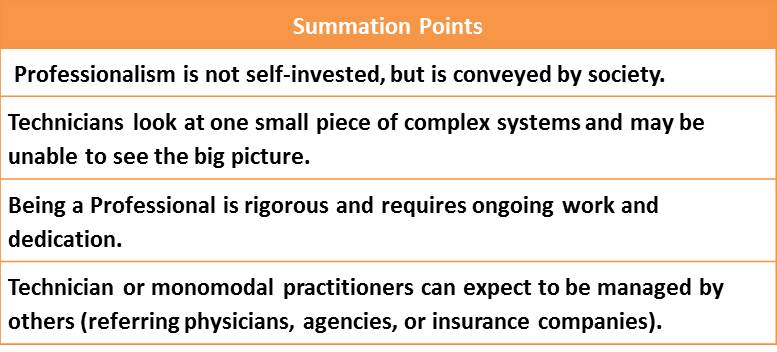Is chiropractic a profession or a modality?
Is chiropractic a single modality: the adjustment? Or is it a profession that uses adjustments and other skill sets to care for patients? The Council on Chiropractic Education (CCE) has clearly defined their view of chiropractic (i) as being a multifaceted profession, not simply a singular treatment modality that is broadly applied. The answer to this rhetorical question (Is chiropractic a profession or a modality?) has clearly been answered. The real question to ask is: Do chiropractors have a clear understanding of what society expects from its professionals?
After assessing literature on professionalism and public trust, I am convinced that acquiring a professional degree does not make one a professional any more than being born a nobleman makes one noble in character. It is society that grants the status of being a professional, not colleges or licensing boards. Here is a synopsis of the traits that society expects from those in the professions:

Hallmarks of a Profession
- Rigorous intellectualism: A profession engages in scholarly activity and research. Professions pursue evidence, not dogma or sacredly held tenets.
- Ownership of particular knowledge and skills (which certainly can be the chiropractic adjustment)
- An arduous and lengthy education process and highly selective licensing procedures.
- Professionals earn a prosperous livelihood from their expertise, but they value their societal contribution over material gain.
- Professionals are held to higher standards of ethics than the rest of society.
- Professional organizations police their own ranks and discipline unscrupulous behavior.
In contrast, technicians are limited in their view of problems and solutions, have limited intellectual rigor, and less ethical esteem by society. They may have only one or two interventions at their disposal and may try to encompass more than they should with those interventions. Consequently other professions consider technicians incompetent case managers and will insist on managing any cases referred to the technician. If chiropractors are limited to being a single modality, other professions will be very specific and limited in the types of cases that they refer to chiropractors.
Chiropractors enter into this profession voluntarily and should be prepared to live up to the arduous standards imposed on all professions. We are not technicians. If we were to limit ourselves to one treatment option, our patients would be denied these other evidence-based interventions, and we would be surrendering our professional status to one of a single-minded technician. We should embrace our proficiency in manual adjusting along with broad-based integration of diagnostics and other drug-free treatment options, and collegial integration with other healthcare professions.
